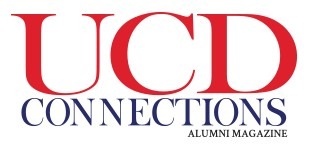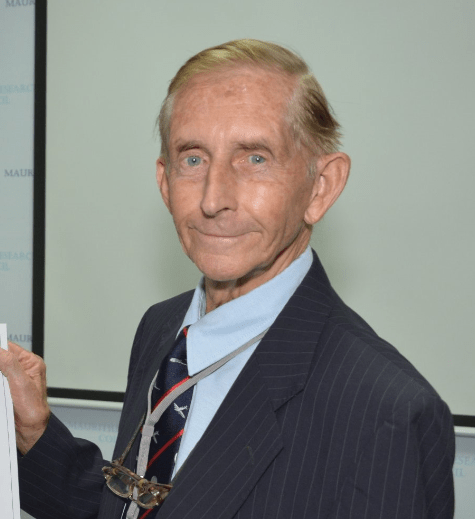Born in Wales to Irish parents, Captain Twomey spent two years in the Royal Air Force before studying Economics at UCD. In this interview, he discusses setting up a small airline in Berlin during the Cold War, challenges facing the aviation industry during the COVID-19 pandemic and why more secondary school students should study STEM subjects.
1. Tell us about your experience at UCD.
I look back on my three years 1951-1954 BA course in UCD with very happy memories. My only challenge was that I had come from Britain, having been born in Wales as the eldest son of our very Irish father from Cork; and I was two or three years older (which felt like a lot) than my classmates, due to having spent my first two years after leaving school in the Royal Air Force as part of Britain’s National Service requirement in those postwar years. Two of my three sisters were already UCD students and it was great to be able to join them in their rented flat in Dartmouth Square off Leeson Street. It was a fine arrangement for me; Maureen and Oonagh did all the cooking and the housework, all I had to do was to haul the coal up the stairs from time to time!
2. Why did you decide to study Economics, and what were you hoping to do with the degree?
I had first enrolled to study law, but soon concluded that a courtroom life was not for me, having found that the ‘flying bug’ would not leave me. At the same time it was clear that a degree would be an asset no matter what I ended up doing, and switching to a less specialised subject seemed to be the best idea. The resulting BA in Economics proved its worth later in my career.
3. What are your fondest memories from that time?
I have of course many good memories, just as you would expect from any undergraduate’s life. The first recollection is the occasion – my very first semester – when a rather ‘superior’ professor had obviously made up his mind to put his assembled young listeners in their place, declaring that: “Of course now that you have left school you think you are all very clever. Hah! Let me assure you that you really know nothing. For instance, none of you can fly an aeroplane!” I was too shy to contradict him, although my friends were tugging at my sleeve to make me raise my hand. That I did not do so remains one of my few lifetime regrets!
I tried the evening ‘hops’ but did not find this activity very exciting. My sisters were already in the Legion of Mary, so I joined too. I would go visiting lonely foreign students or elderly people on a very ancient bicycle, often pedaling alongside a strong Legion man called Seamus Grace. Once I met the Legion’s founder, Frank Duff, a memorable and saintly man. The other occupation that filled my free days was to go flying again, having the good fortune to meet Aer Lingus retired Captain Kennedy at his flying school at Weston, which was just a small grass airfield in that epoch. He let me fly his Tiger Moth biplanes for free, on condition that I would take a paying passenger with me who wanted to have a first air experience. Kennedy paid me by letting me fill the tank of my tiny second-hand Fiat Topolino 2-seater with aviation fuel, which in the longterm was a grave mistake as the too-high octane value aviation fuel eventually burned out the Fiat’s valves!
Dr Michael Tierney, UCD’s President at that time, inadvertently supplied another amusing moment. There had been a bit of an upset one night when a few rowdy students had turned a Dublin bus on its side. Interviewed the next morning, Tierney defended UCD by saying that “those young people were NOT my students… (long pause)…. and even if they were, you can be sure they meant no harm”!
4. Did you stay in touch with any of your friends?
After graduating, I married one of them!
5. How did your flying career start?
In my final year, my father, knowing my keenness to continue flying, let me know that the local airline in South Wales (which was still our home) was looking for a co-pilot to fly at weekends during the last summer vacation before my exams. I got the job, and for several busy months worked for Cambrian Airways every Friday, Saturday and Sunday, revising for my Economics degree from Monday to Thursday. Graduating with a BA in October 1954 was surely a miracle.
6. Why did you decide to train as a commercial pilot?
That’s easy to say because although I had learned to fly in the military, I had never considered myself as anything other than a normal civilian. So it was obvious, when I had decided that I wanted to continue a life in the air, that I should set about studying for the required commercial pilot licences. After my first job, I was lucky then to fly for many years with British Airways and other airlines.
7. What is your most memorable moment from your flying career?
If by memorable you mean “happiest day of my life”, it had nothing to do with flying at all. It was the day in 1956 when our first child was born – I was ‘over the moon’! As regards unforgettable career occasions, they would include the day I made my first solo flight at age 19, or the occasion of being promoted to the rank of Captain, or on being appointed to a significant management position in British Airways. But best of all would be the day when my friends and I knew that we had successfully set up our own airline.
8. What was the proudest moment or highlight of your career?
The highlight has to be the planning and operation of “my own” airline in walled-in, Russian tank-surrounded West Berlin, during the closing years of the Cold War.
9. And the most challenging?
That would also be the Berlin project. The challenges consisted of raising equity from venture capital, leasing aircrafts, obtaining Route Licences from both the UK and the Berlin Corridor authorities, finding the right people, flying myself as well as managing the whole small business. This was only possible thanks to friends who together made a wonderful team.
If by ‘challenging’ you really mean ‘dangerous,’ I would think of the time I was flying from Hanover to Berlin in a British Airways Viscount and when approaching the airport of Tempelhof, a call was received from Air Traffic Control saying “We have received a message that there is a bomb on the next aircraft to land. That aircraft is yours…. What are your intentions?” (This is all in my WING TIPS book!)
10. What are the biggest changes to happen to the aviation industry since you started working as a commercial pilot?
As everybody knows there has been a steady growth in the airline industry over the past 50 or 60 years, only halted temporarily, one hopes, by the dreaded COVID-19. It’s hard to believe, but my first “command” was gained in a De Havilland Dragon Rapide biplane, in which a single pilot carried a max of 8 passengers at around 100 mph, whereas only 20 years later I found myself flying 600 mph jets like the Trident (first airliner to land automatically) and the Boeing 737-300, (the first to feature with a so-called “glass cockpit” – digital instruments and with a highly capable autopilot). On top of all that, if I needed to go to New York from London on British Airways business, I could just thumb a ride on a supersonic Concorde! The job of a pilot , which had begun in my youth as an exercise in manual dexterity, even muscle-aching on a windy day, has changed completely into a complicated management task, controlling a hugely expensive and sophisticated piece of fantastic machinery.
11. What advice would you give someone who was just beginning their career?
For a satisfying life’s work, find something that you are passionate about! Then you can say, like so many aviators that I know – “It’s better than work”!
As to piloting, I would issue the reminder that technology (use of autopilots etc) is there only to help you. As Captain you are still very much in charge.
12. What is the best piece of advice that you have ever been given?
From my Dad: “Keep on keeping on”; and from the Chairman of British Airways (schooling me in how to respond in a live media interview): “Don’t ever worry about the questions they ask you – just say what you came here to say”!
13. If you could go back in time, would you do anything differently?
As far as my aviation path is concerned, bad or difficult experiences have always been followed by good ones, with the result that I‘m convinced I have been very blessed in my choice of career. Who would want to change that?
14. What is the most interesting or special place to which you have ever been?
Professionally, I think in terms of challenging airports at which to land or takeoff, and among these I would note Sumburgh in the Shetland Islands, Gibraltar (where a southerly wind blowing around the Rock hits you from different directions at the opposite ends of the runway); and Salzburg (home of the Mozart Festivals) where, as you line up to takeoff, a sheer mountain cliff stares you in the face!
15. What inspired you to write a book? Tell us a bit about it.
There is an old saying that “if you can no longer do it, then write about it”! I have been flying aeroplanes from age 19 until aged 83, only then deciding not to renew my medical category when my last pilot licence became due for renewal at age 84. That’s 5 years ago, but for much longer than that, in the Aeronautical Society of Mauritius that I helped to found, I have been trying to back up the efforts of the education authorities to attract more secondary school students – girls and boys – into picking STEM subjects. In spite of the pandemic, which has delivered a heavy blow to aviation this year, the whole area of Aviation/Aeronautics/Astronautics will be an excellent job-provider in the future. I am hoping that my book WING TIPS, in describing an exciting and satisfying life, will help to motivate them.
Sadly, since the publishing of this article Captain Twomey has passed away. For more information click here.
Captain Twomey was the PRO of the Aeronautical Society of Mauritius. More information can be found on their website: https://aesm.mu

